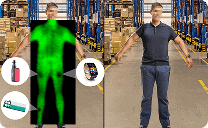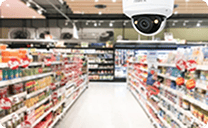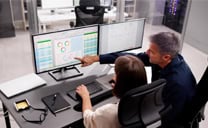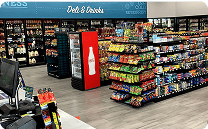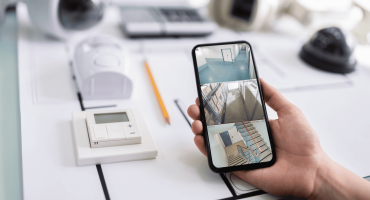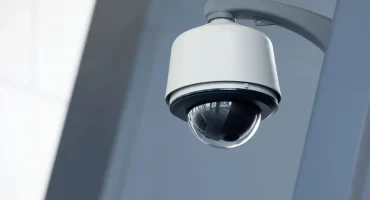In This article
The AI revolution is reshaping industries, institutions, and technologies, including the security sector. The evolution of AI security camera technology is a significant part of this revolution. Before investing in AI security cameras for a retail store, restaurant, or corporate security system, it’s crucial to grasp the key terms and features. This understanding will empower business owners to make informed decisions and derive maximum value from AI cameras.
Evolution of AI in Security Cameras
AI has been a game-changer in security, first appearing in security cameras in the 1980s and later in the early 2000s. Its continuous evolution has significantly enhanced security systems’ capabilities.
- 1980s–1990s: AI improved threat recognition in security systems by comparing patterns and triggering alarms when it detected differences.
- 2000s: Machine learning algorithms expand the quality of anomaly detection and behavioral analysis
- Early 2000s: Motion detection was added.
- 2010s: Deep learning analyzes network traffic, reveals phishing attacks, and detects malware.
- 2010s: Deep learning’s impact on AI security cameras led to new capabilities, such as facial, object, and license plate recognition; intrusion detection; and predictive security.
Key Terms in AI Cameras
Understanding the key terms related to AI is essential to fully appreciate the value of AI security cameras. These terms provide a foundation for comprehending technology and its potential benefits.
- Artificial Intelligence (AI) simulates human intelligence, so computers and machines can learn, reason, solve problems, and communicate similarly to humans.
- Machine learning is a subset of AI in which computers learn without programming, using data instead to identify, predict, and adapt to new data.
- Deep learning is a subset of machine learning, operating at a deeper level for more complex tasks.
- Neural networks are used by deep learning to create computer models similar to the arrangement and operation of the human brain.
AI Camera Features Explained
Businesses that invest wisely in AI security cameras know it’s crucial to understand their primary features. Misapplications can result in insufficient security or more security than is required.
- Object recognition: AI cameras can identify objects accurately and distinguish one from another at a greater distance.
- Motion detection: AI cameras can recognize movement and determine when a person’s movement may be suspicious or normal.
- Real-time alerts: Immediate recognition of and response to a potential threat is a primary benefit of AI security cameras.
- Behavioral analysis: AI cameras can recognize and analyze the behaviors of customers, employees, and suppliers based on what the algorithms have learned from past video data.
- Facial recognition, environmental and crowd monitoring, audio analysis, and cloud integration are other features that make AI security cameras so valuable.
Benefits of AI in Security Cameras
AI significantly enhances the capabilities and value of security cameras, instilling a sense of security and protection. Even small businesses with a few AI security cameras can be as secure as the largest companies with cameras in multiple locations.
- More accurate detection of threats – With object recognition, motion detection, and similar features, AI security cameras can identify threats quicker and generate real-time alerts.
- Reduced false alarms – These same features minimize false alarms so security personnel can focus their time and attention on valid threats.
- Improved surveillance efficiency: AI security cameras automate many routine security tasks to enhance monitoring.
- Better data management: These cameras store captured video locally or in the cloud, categorize it, and allow quick retrieval for analysis.
- Proactive prevention: AI security cameras recognize threats in real-time, enabling immediate monitoring and faster response.
Challenges in AI Camera Technology
Although AI security cameras are a big step forward in security technology and a welcome option for all businesses, they present some challenges. Most are common to the use of all advanced technologies.
- The data dilemma – Without data (and massive amounts of it), AI couldn’t deliver the many benefits of AI security cameras and systems.
- Solutions to secure data management – With ethical AI practices and training, a business can maximize the value of security data and respect personnel and other sensitive data.
- Constant upgrades – AI security cameras and systems perform optimally with upgraded hardware and software.
- Performance solutions – Regular assessment of AI security cameras and upgrading them as needed will save money and provide maximum security. A well-planned maintenance schedule will extend the life of cameras and systems.
Future Trends in AI Cameras
The future is bright for AI security cameras. Continuous developments in features and systems result in more secure environments for the businesses that rely on these cameras.
- Better image quality – Optics and sensors will deliver higher-quality images, especially in low-light situations.
- Advanced analytics – Edge computing will allow for AI processing in a camera to detect threats faster.
- Improved innovative technology – AI security cameras will more easily integrate with other security systems, including advanced remote monitoring, and operate with less human interaction.
- AI-powered drones – Drones are already an important surveillance tool, but AI technology will allow drones to perform video analysis, scan areas without stationary cameras, and operate more autonomously.
- Data security – New technologies will enhance the protection of sensitive data, upgrade compliance, and deliver greater operational transparency.
Conclusion
AI security cameras are quickly becoming the standard to ensure secure business facilities and operations. Understanding their features, how they work, and descriptive terminology is necessary to benefit fully from their use. Although artificial intelligence, machine learning, and other terms may require a learning curve for some business owners, these and other technologies are the present and future of AI security cameras and systems.
AI will continue to evolve and significantly increase the value of adding AI security cameras to any security system. Today’s features will only improve, giving any business more tools to detect and deter more threats. To learn more about VIDEOiQ, DTiQ’s intelligent AI-driven video solutions, visit our website.
Frequently Asked Questions
What is an AI camera, and how does it work?
AI cameras utilize artificial intelligence and machine learning technologies to improve upon all the tasks business owners expect from security cameras and security systems. AI algorithms upgrade cameras’ viewing quality, object and facial recognition, and threat detection accuracy. They can “learn” various patterns and behaviors with machine-learning technology to accurately analyze future events and incidents.
How is AI different from traditional camera technology?
Traditional security cameras are quite limited in their capabilities, which limits their use in a world that needs more security. When AI technology is integrated with security cameras and systems, business owners and their security personnel have a new array of upgrades and tools. Security cameras with AI produce sharper imaging and clearer views under low-light conditions. AI security cameras are more autonomous and capable of performing video data analysis in the camera, for example. By comparison, traditional camera technology only delivers basic functions, which are insufficient for addressing increasing threats.
What are the most important features to look for in an AI security camera?
Object and facial recognition, and more precise motion detection capabilities, are vastly improved in AI security cameras. There are fewer false alarms, wasting employees’ valuable time, but legitimate alarms are sent quickly to security personnel, onsite or at remote locations. Another important feature is how easily AI security cameras can be integrated with existing systems. Plus, real-time video analysis immediately responds to threats and incidents.
Is AI in security cameras suitable for both personal and commercial use?
Yes. Whether protecting a small retail store, a restaurant, a large warehouse, a corporate campus, or a home, the features and functions of AI security cameras are applicable in all these settings.
The commercial uses and benefits are thoroughly explained above, making it clear that any commercial establishment must rely on AI security cameras. Homeowners also need facial recognition, intrusion detection, intruder alerts, and behavior tracking. As the eyes of a home security system, AI security cameras can perform real-time monitoring and send remote alerts.
